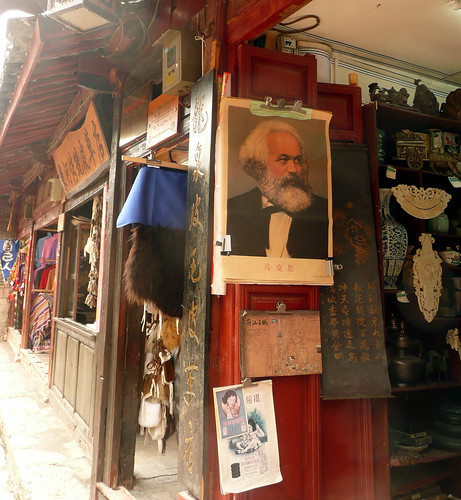Marxist theory
Capitalism and degrowth: An impossibility theorem

By John Bellamy Foster
January 2011 -- Monthly Review -- In the opening paragraph to his 2009 book, Storms of My Grandchildren, James Hansen, the world’s foremost scientific authority on global warming, declared: “Planet Earth, creation, the world in which civilization developed, the world with climate patterns that we know and stable shorelines, is in imminent peril…The startling conclusion is that continued exploitation of all fossil fuels on Earth threatens not only the other millions of species on the planet but also the survival of humanity itself—and the timetable is shorter than we thought.”1
China: An international dialogue on Marx

A trader in Lijang, China, selling images of Karl Marx. Photo by Malias.
By Norman Levine
January 4, 2010 -- Links International Journal of Socialist Renewal -- Organised by Marcello Musto of York University (Toronto, Canada), an international delegation of scholars from Canada (Marcello Musto and George Comninel), USA (Norman Levine), England (Terrell Carver), Japan (Hiroshi Uchida and Kenji Mori) and South Korea (Seongjin Jeong) participated in a two-week series of colloquiums and lectures in China. This delegation was invited and graciously hosted by Fudan University of Shanghai and Nanjing University (two of the top five universities in China), and by the Chinese Academy of Social Sciences (CASS) and the Chinese Central Compilation and Translation Bureau (CCTB) of Beijing. The faculties and administration of each of these institutions partnered in these colloquiums, which also saw the participation of Chinese academics from 23 different universities (and, among them, of many deans and chairs of departments).
Marx-Engels Gesamtausgabe (MEGA2): Has another Marx been revealed?

France, 2010: 'Karl Marx is not dead.'
Fred Magdoff: Creating an ecological civilisation

By Fred Magdoff
``It is inconceivable that capitalism itself will lead directly to an ecological civilization that provides the basic needs for all people. However, building an ecological civilization that is socially just will not automatically happen in post-capitalist societies. It will occur only through the concerted action and constant vigilance of an engaged population.''
January 2011 -- Monthly Review -- Given the overwhelming harm being done to the world’s environment and to its people, it is essential today to consider how we might organize a truly ecological civilization—one that exists in harmony with natural systems—instead of trying to overwhelm and dominate nature. This is not just an ethical issue; it is essential for our survival as a species and the survival of many other species that we reverse the degradation of the earth’s life support systems that once provided dependable climate, clean air, clean water (fresh and ocean), bountiful oceans, and healthy and productive soils.
Los seres humanos como centro de nuestro socialismo

[English at http://links.org.au/node/2042.]
Por Federico Fuentes, traducido por Janet Duckworth
Resena sobre libro, La alternativa socialista: el verdadero desarrollo humano, de Michael Lebowitz
Green Left Weekly/Links International Journal of Socialist Renewal -- La llegada de la crisis económica mundial a mediados de 2008, simbolizada por el colapso de algunas de las empresas más icónicas de Wall Street, condujo a un incremento vertiginoso de las ventas de El Capital, la obra maestra de Carlos Marx, porque mucha gente buscó una explicación de los acontecimientos apocalípticos que se estaban desarrollando.
Putting humans back into socialism

Review by Federico Fuentes
The Socialist Alternative: Real Human Development
By Michael Lebowitz
Monthly Review Press, 2010
December 5, 2010 -- Green Left Weekly -- The onset of the global economic crisis in mid 2008, symbolised by the collapse of some of Wall Street’s most iconic companies, led to soaring sales of Karl Marx’s seminal work Das Kapital, as many sought explanations to the tumultuous events unfolding. Although written more than 100 years ago, this devastating and insightful dissection of how capital functions is still a powerful tool for people looking to understand and change the world.
Marx’s aim was to provide a handbook for working-class activists that unravelled the logic of capital and its inherently exploitative nature. Marx said this was necessary because as long as workers did not understand that capital was the result of their exploitation, they would not be able to defeat their enemy.
Τζον Μπέλαμι Φόστερ: Μια οικολογική επανάσταση ενάντια στον καπιταλισμό
The Ecological Revolution, Making Peace with the Planet
John Bellamy Foster
Νέα Υόρκη: Monthly Review Press 2009
σελ. 328.
Του Σάιμον Μπάτλερ*
[Αγγλική εκδοχή σε http://links.org.au/node/1193.]
Currency wars and the privilege of empire

By Paul Kellogg
October 23, 2010 -- PolEconAnalysis -- In uncertain times, the headline was soothing: "Secretary Geithner vows not to devalue dollar".[1] United States Secretary of the Treasury Timothy Geithner was saying, in other words, that if there were to be "currency wars" -- competitive devaluations by major economies in attempts to gain trade advantage with their rivals -- the United States would not be to blame. Who, then, would be the villain? China, of course.
Earlier this year, Democratic Party congressman Tim Murphy sponsored a bill authorising the United States to impose duties on Chinese imports, made too inexpensive (according to Murphy and most other commentators) by an artificially devalued Chinese currency. "It's time to deliver a strong message to Beijing on behalf of American manufacturing: Congress will do whatever it takes to protect American jobs."[2]

